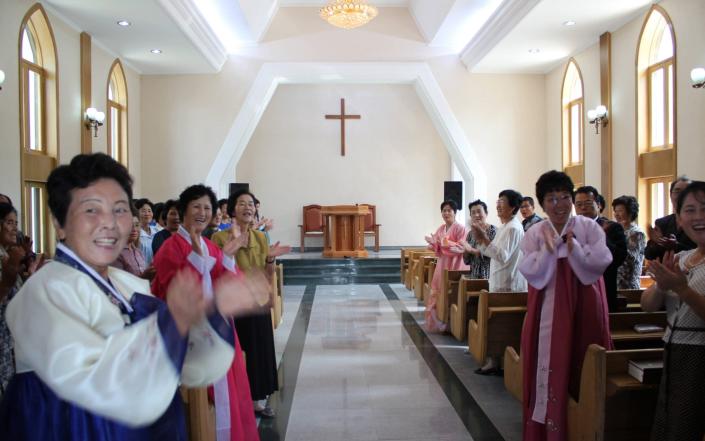A toddler was sentenced to life imprisonment in North Korea after the child’s family was found in possession of a Bible, according to a new report by the US State Department.
Although the incident took place in 2009, it has been highlighted in the department’s new report on international religious freedoms this month, citing data from Korea Future, a non-governmental organisation documenting human rights abuses in North Korea.
“One case involved the 2009 arrest of a family based on their religious practices and possession of a Bible.
“The entire family, including a two-year-old child, were given life sentences in political prison camps,” it said.
There are estimated to be between 200,000 and 400,000 clandestine Christians in the North Korea, mainly in the West where many are believed to have settled after an “explosion” of interest in the religion in 1907.
Korea Future’s report was based on interviews between 2007 and 2020 with 244 victims of religious persecution, who had been subjected to arrest, detention, forced labour, torture, denial of fair trial or right to life, and to sexual violence, for practicing Shamanism or Christian beliefs.
The findings reflect the regime’s paranoia over religious minorities and its lack of tolerance for any belief other than absolute devotion to the ruling Kim family as they seek to maintain their iron grip on power.
The North Korean regime has tried to stamp out Christianity for decades, and is said to fear the influence of the church after studying its role in the collapse of the Iron Curtain in Europe in the 1980s.
Defectors have revealed horrific details of Christians being brutally tortured, killed and incarcerated in gulags.
There are a handful of Christian churches across the country, including four in Pyongyang. But most observers say these are just “show churches”.
‘Death is only a mistake away’
It is estimated that between 50,000 to 70,000 North Korean citizens are held in prison for their Christian beliefs, according to Open Doors USA (ODUSA), which advocates for persecuted Christians around the world.
The group has stated that “life for Christians … is a constant cauldron of pressure; capture or death is only a mistake away.”
In its “World Watch List” report, released earlier this year, Open Doors said Pyongyang had intensified its hounding of Christians, hunting for underground churches.
It documented a “horrifying incident” where several dozen believers were discovered and executed, with more than 100 of their family members sent to labour camps.

Followers of Shamanism and Cheondoism, a modern religious movement based on a 19th-century Korean neo-Confucian movement, are also targeted by the North Korean regime.
Several survivors who were imprisoned for Shamanism also described horrendous conditions in prison camps, where they testified to being beaten, forced into stress positions and given contaminated food, the state department said.
“[Officials] worked us hard without feeding us properly… I suffered from malnutrition and was sure I would not survive. I kept having diarrhoea, even when I only drank water, and I weighed just 35 kilograms [77 pounds]… so I was like a skeleton back then,” said one former prisoner.
The state department report concluded that the situation in North Korea has “not fundamentally changed” since a damning 2014 United Nations Commission of Inquiry report on the deprivation of human rights there.
It noted that the inquiry “found that authorities almost completely denied the rights to freedom of thought, conscience, and religion and determined the government in many instances committed violations of human rights that constituted crimes against humanity.”
Since the start of the pandemic, North Korea has also become increasingly more difficult to escape from.
A Reuters investigation published on Monday used commercial satellite images to show how the regime has used the health crisis as an opportunity to build hundreds of miles of new or upgraded border fences, walls and guard posts to lock its people in.
Broaden your horizons with award-winning British journalism. Try The Telegraph free for 1 month, then enjoy 1 year for just $9 with our US-exclusive offer.
















